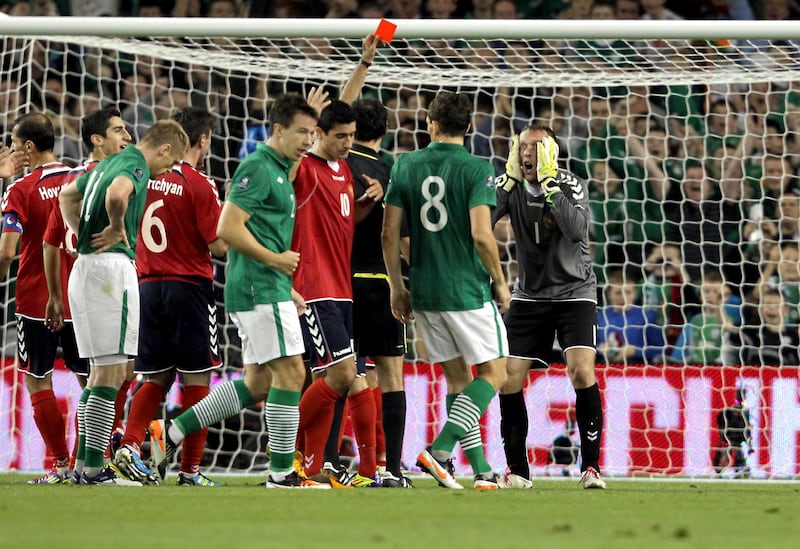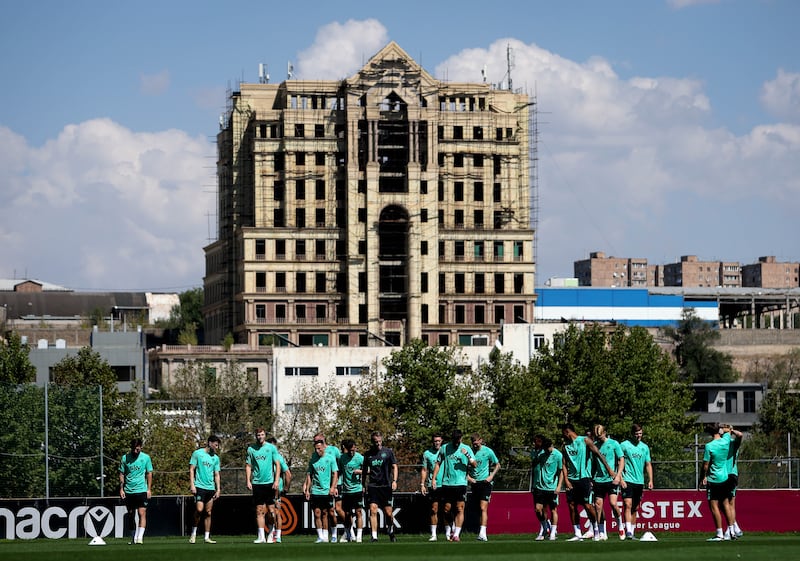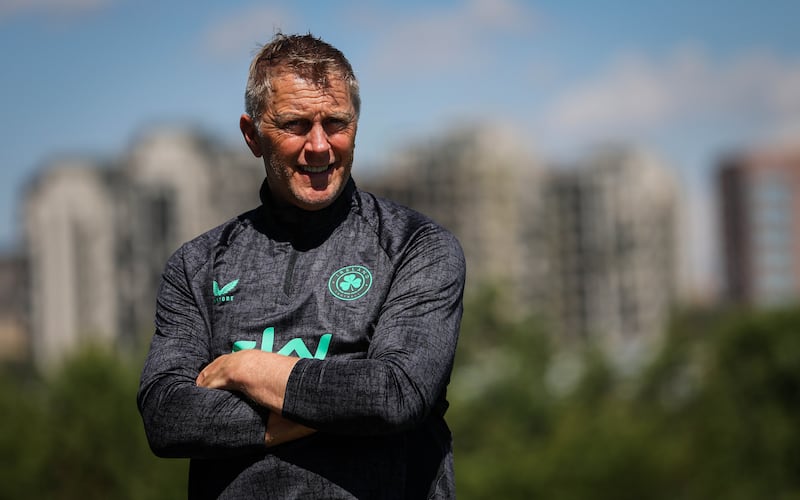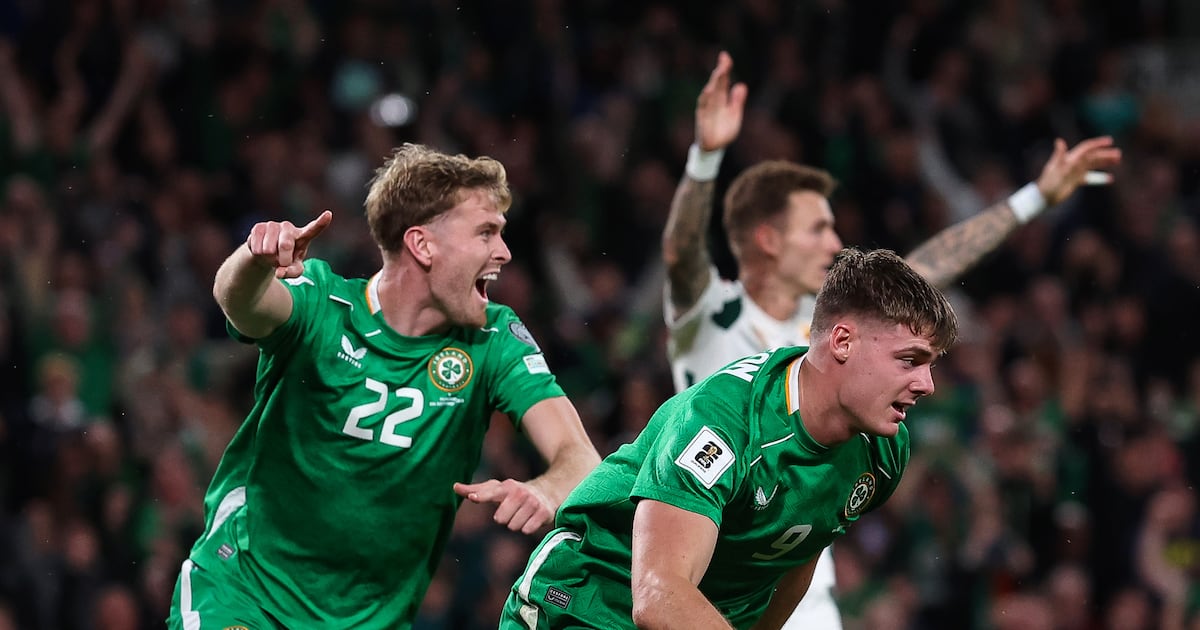People in Ireland never talk about this, but the Roman Berezovski red card of 2011 is the Thierry Henry handball of Armenian football history. The whole scandal happened before our eyes in Dublin – we were the direct beneficiaries of the injustice – but nobody took any notice of Armenia’s pain, either at the time or in the years since.
The Spanish referee, Eduardo Iturralde González, is the Armenian equivalent of Martin Hansson, the Swede who didn’t see Henry handle the ball in Paris. The Dublin Infamy took place in October 2011 when Ireland played Armenia in what amounted to a shootout for the Euro 2012 playoffs. Just 26 minutes had passed when Gonzalez sent off Berezovski, the Armenian goalkeeper, for allegedly handling the ball outside the box. The reality, as Armenian fans bitterly remember, was that Simon Cox had handled the ball and Berezovski had only chested it.
 Armenia goalkeeper Roman Berezovsky is sent off in a Euro 2012 qualifier against Ireland at the Aviva Stadium. Photograph: Donall Farmer/Inpho
Armenia goalkeeper Roman Berezovsky is sent off in a Euro 2012 qualifier against Ireland at the Aviva Stadium. Photograph: Donall Farmer/Inpho
Ireland subsequently went 2-0 up against the 10 men before Henrikh Mkhitaryan pulled one back for Armenia. That was the end of the scoring and Ireland went through while Armenia’s best-ever team finished third and stayed home.
The Armenian FA filed an official complaint about the refereeing but nobody at UEFA cared. Ireland, blithely indifferent, sailed on to the Euros where they sank without trace. Our campaign was nearly as bad as France’s fiasco at the 2010 World Cup – that tournament being their ill-gotten gains from the Paris playoff. So maybe the Irish-Armenian karma has levelled itself out.
Actually, Armenia beat Ireland 1-0 in the 2022 Nations League with a stunning long-range goal from midfielder Eduard Spertsyan. Spertsyan also scored in the return in Dublin, when Ireland won 3-2 thanks to a late penalty. He has scored three times already this year, so there is no question about who the dangerman is.
The general form of Armenia, though, is poor, with 21 goals conceded in five matches this year. Armenia’s previous coach, the Dutchman Johnny van ’t Schip, lasted only four matches, a run that included the 9-1 aggregate defeat to Georgia in the Nations League playoffs. His replacement is Yegishe Melikyan, whose first game was Saturday’s 5-0 hammering by Portugal in Yerevan.
Four of Portugal’s five goals originated with crosses into the box, which is promising from an Irish point of view. The Armenian defence seemed equally in disarray whether the task was to mark a player standing five yards in front of the middle of their goal, as for Joao Felix’s 1-0 and Cristiano Ronaldo’s 2-0, or organising to defend against the second ball, as for Joao Cancelo’s 3-0.
 Ireland training in Yerevan on Monday ahead of Tuesday evening’s World Cup qualifier against Armenia. Photograph: Ryan Byrne/Inpho
Ireland training in Yerevan on Monday ahead of Tuesday evening’s World Cup qualifier against Armenia. Photograph: Ryan Byrne/Inpho
It was noticeable that when Ronaldo scored his goals – the second lashed in from 25 yards, just like the good old days – the roars from the crowd made it sound like a Portugal home game. At 40, Ronaldo is no longer a football player but a touring wonder of the world. People who make it in to see one of the last ever Ronaldo appearances (surely, by now, we must be down to the last . . . 40 or 50 games?) want to see him score, even if it’s against their team.
The Armenian crowd that turns up this evening will not be as excited about getting to see Evan Ferguson, but maybe one day they’ll be bragging about seeing him play when he was only 20.
Ireland manager Heimir Hallgrímsson was asked whether the centre-forward is fit enough for a second game in 72 hours. “You’ll see,” he replied, though it sounds as though Ferguson will be starting again. Every player is different, but bigger players like Ferguson often say they feel at their fittest when they’re playing lots of games in a row.
The way Ferguson took on Hungarian defenders both to get that shot in before half-time and then to win the free-kick from which Ireland scored their first goal showed a player who is feeling confident again in his own strength.
Ireland will try to avoid conceding the first goal for the ninth time in 10 matches under Hallgrímsson. “You can never just say it’s bad luck; of course you can analyse every goal and see things that we could have done better as players,” the coach reflected.
So, what can we learn from looking back at the eight opening goals we have conceded in nine games so far?
 Ireland manager Heimir Hallgrímsson oversees training on Monday in Yerevan. Photograph: Ryan Byrne/Inpho
Ireland manager Heimir Hallgrímsson oversees training on Monday in Yerevan. Photograph: Ryan Byrne/Inpho
We can say that we seem more vulnerable at the beginning of halves. England, Bulgaria and Hungary all scored the opener in the first 10 minutes of the first half, while England and Greece (twice) scored in the first five minutes of the second.
Of course, not every goal is down to defensive mistakes; the opponent’s quality is part of it too. Ireland, though, have contributed a good variety of mistakes, whether it be standing too far off the shooter or backing off when you should be charging down (twice against Greece, once against Bulgaria), forgetting to push up the defensive line (Hungary), reacting too slow to second balls (England, Bulgaria, Hungary), failing to anticipate long passes towards runners from deep (England, twice), or simply playing the opposing striker in with an under-hit backpass (Finland).
If there is a common thread here, it’s passivity, a slowness to act or react. This at least has been identified by Hallgrímsson as one of the most important things the team has to get right. He wants a team that is alert and aggressive. But saying and doing are different things.

